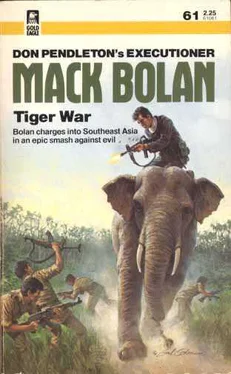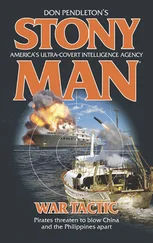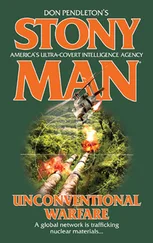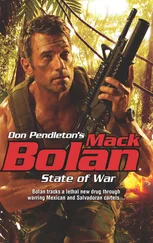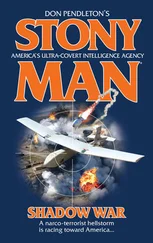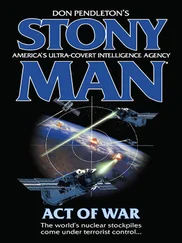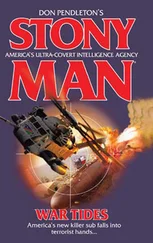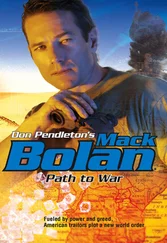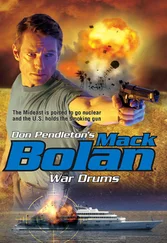Finally there was silence, broken only by the crackle of flames. Around him things were burning — wreckage, trees, leaves, bark, even himself. He jumped to his feet and beat out his smoking clothes.
Bolan heard the sound of running feet. "Are you all right?" shouted Nark.
"So far," said Bolan. He picked up his weapon and stared pensively at the destruction around him. A minute ago the forest was filled with the noise of a sleek killer machine at whose command sat two men. Now that was history, the men vaporized, the machine so much junk.
"We've lost the packhorse and the radio," said Nark. "The other horses are okay."
On the way back to the horses Bolan said, "Tiger must be rich to afford helicopters like that. They come fifteen million dollars apiece."
"There's no shortage of money in that business," Nark replied. "In the States alone, illicit drugs is a ninety-billion-dollar-a-year industry. Ninety billion! Can you imagine? Only Exxon is bigger."
"Yeah, well," said Bolan, coming to his horse, "let's see what we can do to change that.''
From atop a ridge, hidden by bushes, Bolan and Nark surveyed the Tiger hardsite. The place reminded Bolan of one of those company towns that grow up in the middle of nowhere around a source of raw material. At one end was the industrial section with the heroin refinery, a long, three-story brick building with chimneys. Next to it were opium warehouses, a water tower, a power plant, tool sheds, and administration offices. At the other end was a residential section of neat villas with flowers, tree-lined alleys, shops and a park. But it was a militarized company town. The center was a parade ground with a flagpole, and there were barracks, lots of soldiers, an LZ with helicopters, and mortar facing the jungle.
The entrance to the town was a pair of heavy iron gates over which was a flag-bedecked arch. Written on the arch in Chinese characters was the name of Tiger's parent company, 93rd Kuomintang Division.
"They still use the old name," Bolan observed.
"Very proud of it," said Nark.
"Yeah, I guess from their point of view they're a real success story."
"At least someone got something out of the Vietnam War," Nark remarked.
It was the Vietnam War, or more precisely its outcome, that launched the 93rd into the heroin business. Prior to the war the division was basically a military organization dealing in opium on the side as a means of amassing money for the reconquest of the homeland.
This ambition was encouraged by the U.S., which used the 93rd, and other Nationalist army units that escaped when the Communists conquered in 1949, for the forays into China to destabilize the Communist regime.
The Vietnam War changed that. The U.S. defeat, with the emergence of Vietnam as a pro-Moscow satellite, upset the balance of power in the region, and to offset it, Washington was forced to seek a rapprochement with China. In due course the Communist regime was given diplomatic recognition, the trade embargo was lifted, President Nixon toasted Chairman Mao, and the CIA washed its hands of the 93rd. A twenty-year dream died.
To the men of the 93rd this was a bitter blow, and the division began disintegrating. Some of its members turned to banditry, while others prepared to emigrate to Taiwan, now the seat of the Nationalist regime. But a group of young men managed to arrest the disintegration process by offering its members the prospect of another adventure, a much more profitable one this time.
Until that moment the 93rd merely bought the opium from Montagnards for resale to Bangkok merchants. Now it went into the actual production of heroin. Not only that, it expanded into the other facets of the trade: shipping, packaging, distribution — even retailing with the creation of a chain of smoking dens.
Finally it went international, creating subsidiaries on four continents. Tiger's huge money reserves — capital that it had accumulated over twenty years to buy the latest weapons when the big day came — gave the 93rd, now renamed Tiger Enterprises, a considerable edge over the competition. So did its military command structure. By the sixteenth year of operation, Tiger was the world's biggest heroin ring. In a business already noted for success stories, thanks mainly to a combination of liberal laws and public inertia, Tiger managed to outshine them all.
Now it was Bolan's intent to put an end to that success story. But he would do it his own way, fired by personal feelings. The site was surrounded by two wire fences, both electrified, separated by a mine strip. Behind the fences at regular intervals were sandbag emplacements with mortar, and turrets with arc lights and machine guns. And there was only one entrance: the iron gates.
Out of his haversack, Bolan brought a pad and pencil and began sketching the site. First he drew a general map, then proceeded to sketch the individual targets. With the Meo one had to be strictly visual. You could tell a GI his target would be a three-story building with chimneys, but not the Meo. Their language had no term for chimney — in Meo huts the smoke went out through a hole in the roof — and the Meo did not understand the concept of multistory building. Similarly, in marking distance between targets, Bolan marked them as so many hut lengths apart. The Meo did not know meters or yards, but counted length in huts for short distances, while long distances were counted by how many cigarettes one smoked en route.
The sketching over, Bolan designated the targets. There were three primary targets, one in the industrial sector and two in the residential area.
In the industrial sector the primary target was the administration building. Not only did it contain the communications center that Tiger could use to summon help, the basement housed Tiger Enterprises' worldwide files. As soon as the building was secured, a helicopter would come to transport the files to a ship in the Andaman Sea. There they would be sifted, and pertinent information would be passed on to Washington for immediate exploitation. On four continents, agents of the NSA and the Drug Enforcement Administration were standing by to strike against Tiger.
The two primary targets in the residential section were the home of Tiger's president, Colonel Liu Hsiao, and a two-story guest villa that was housing Tiger's fourteen directors while they attended the company's annual meeting. The strike had been planned to coincide with the meeting. All fifteen men were to be executed by Bolan. Personally. It was that kind of war. The enemy would understand no other.
"I think we're going to get some entertainment," said Nark.
On the parade ground soldiers were setting up chairs in a semicircle. Then from a nearby building came a group of men dressed in kendo uniforms. Each man carried a sword.
"The man with the bandanna is Liu," said Nark.
So this is the man who has vowed to turn America into a nation of junkies.... Bolan focused his field glasses on the Tiger president. Bolan always found it interesting to compare a gangster with what he had read about him, and in most cases the real thing was a disappointment, imagination inevitably being more romantic than reality. But not in this case. This man, Bolan decided, was every inch the prince of darkness. Handsome, athletic, he had deliberate movements and a commanding presence.
What Bolan had read about Liu was this: The son of General Liu, commander of the 93rd, now dead, Liu was educated in Japan in honor of his Japanese mother who died in childbirth. The mother was the daughter of a samurai, and in keeping with tradition, Liu was sent to one of those select boarding schools that still taught bunbu itchi, or pen-and-sword-in-accord, an ancient art that combined calligraphy with swordsmanship.
Читать дальше
